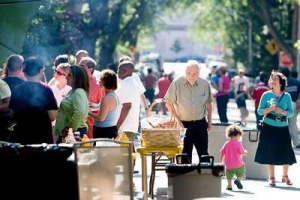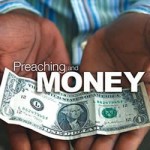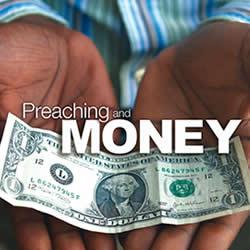 I am sure you have either read or watched the movie of C. S. Lewis’ classic children’s novel, The Lion, the Witch, and the Wardrobe.
I am sure you have either read or watched the movie of C. S. Lewis’ classic children’s novel, The Lion, the Witch, and the Wardrobe.
It is a great story, and if you haven’t read the book, you really need to. If you feel silly reading it as an adult, read it to your kids (or grand kids). You will like it more than they do. If you haven’t read the book or seen the movie (though I’m not sure how that’s possible), I am about to ruin the ending…. so be warned.
Something has often bothered me about the ending of the book: It has the wrong conclusion.
The Lion, the Witch, and the Wardrobe
The story is exactly right in its depiction of Aslan as the righteous King, who sacrifices Himself to meet the demands for justice by Queen Jadis. This is what Jesus did on the cross to defeat our archenemy, Satan. In fact, this novel by Lewis does a masterful job of explaining and defending the Christus Victor view of the atonement, which I think is the correct view.
Check out this video from Greg Boyd to see what I mean:
So C. S. Lewis does a masterful job showing how Aslan went to the stone table as a willing substitute for the sins of Edmund, and how Jadis gleefully killed Aslan, thinking that by doing so, she had finally defeated Him and won her right to rule over all Narnia as she pleased. But she didn’t know, as Aslan later explained to Susan and Lucy, about the deeper magic, which allowed Aslan to rise from the dead and remove any claim upon Edmund that Jadis might have had.
Wonderful. Beautiful. Right in line with Scripture.
But then the story takes a curious turn….
The Wrong Ending to The Lion, the Witch, and the Wardrobe
 Following Aslan’s resurrection, C. S. Lewis has Aslan, Susan, and Lucy race off to the castle of the White Witch, where they “thaw” out all the creatures of Narnia who had been turned to stone, and then return with this army of creatures to help Peter, Edmund, and the Narnians defeat the Witch Jadis and her evil army.
Following Aslan’s resurrection, C. S. Lewis has Aslan, Susan, and Lucy race off to the castle of the White Witch, where they “thaw” out all the creatures of Narnia who had been turned to stone, and then return with this army of creatures to help Peter, Edmund, and the Narnians defeat the Witch Jadis and her evil army.
Near the conclusion of the battle, Aslan pounces on the White Witch and kills her. Then the four Pevensie children become Kings and Queens of Narnia until they eventually return to London.
The End.
It is a wonderful story. The problem is that the battle part of the story does not fit what actually happens in Scripture.
The RIGHT Ending to The Lion, the Witch, and the Wardrobe
To be true to the biblical account, C. S. Lewis should have ended the story this way:
After Aslan rises from the dead and explains to Lucy and Susan what happened, He should say something like, “And now Queen Jadis has been defeated. So I am going away for a time, and when I come again, I will take you with me.”
 To this, Lucy says, “Not to disagree, Aslan, but Queen Jadis is still very much alive. In fact, at this very moment, she is slaughtering the Narnians, and our brothers, Peter and Edmund, are in danger of being killed as well. Isn’t there anything you can do?”
To this, Lucy says, “Not to disagree, Aslan, but Queen Jadis is still very much alive. In fact, at this very moment, she is slaughtering the Narnians, and our brothers, Peter and Edmund, are in danger of being killed as well. Isn’t there anything you can do?”
“Lucy, Lucy,” Aslan replies. “Jadis is a defeated foe. She hates you because she hated me first. I came to be delivered into the hands of Jadis, but now that she is defeated, I am about to enter into my glory. Your task is to proclaim this message throughout all Narnia, beginning in Cair Paravel.”
“But Aslan!” Susan cried. “Did you not hear what Lucy said? Peter, Edmund, and the rest of the Narnians are fighting for their very lives right this instant! The Queen is going to kill them all and winter will come upon us once again! Aren’t you going to restore and protect your kingdom?”
“Oh, my dear child,” laughs Aslan. “It is not for you to know the times or seasons when the Kingdom will be set up. But you will receive power not many days hence, and by this power, you will proclaim to the ends of all Narnia that I have died, risen from the dead, and defeated Queen Jadis.”
“But that’s the point!” both girls said at once. Lucy continued, “Jadis is still alive and well! She is killing Narnians right over that mountain. Right now. She is not dead. She is not defeated.” But as she spoke, Aslan rose up into the air and floated off into the clouds until He was out of their sight.
The End
Lewis didn’t end his story this way, because it makes a horrible ending. But read Luke 24, John 21, and Acts 1. This is pretty much how the story of Jesus’ first coming concluded.
What Was C. S. Lewis Thinking?
Though we cannot know what C. S. Lewis was thinking, I do have a few theories.
First, it is possible Lewis meant nothing whatsoever by the ending. It is true that Lewis often stated that when he wrote The Lion, the Witch, and the Wardrobe, he was not intentionally writing an allegory about Jesus. Of course, whether he intended to do so or not, the story is clearly allegorical. Aslan is obviously Jesus. The four children obviously represent humanity. Jadis obviously represents Satan. The death of Aslan at the hand of Jadis represents the death of Jesus on the cross. The resurrection of Aslan represents the resurrection of Jesus. But maybe that is where the parallels stop, and we shouldn’t try to make all the events in Lewis’ story fit events in the Bible.
If so, then Lewis wasn’t trying to get the story to match the Bible, but was simply writing a good story. He liked ending it with a battle in which the bad people die. Who doesn’t like a story like this? So maybe Lewis finished his story the way he did because it makes a better ending than the one we find in the Bible.
But I am not content with that explanation…
So maybe it could be argued that that battle between Aslan and Jadis at the end of The Lion, the Witch, and the Wardrobe is intended to depict the battle that rages in the book of Revelation, but then this does not explain why C. S. Lewis wrote The Last Battle (which is a book I am re-reading right now, and will write a post on at a future date).
Ultimately, it seems that no matter how we look at it, the end of The Lion, the Witch, and the Wardrobe does not fit with Scripture.
After Jesus rises from the dead, the Bible records numerous objections and questions and confusion about what exactly Jesus did (or didn’t do). Then Jesus ascends into heaven, and there is more confusion. Afterwards in Acts 2, the apostles receive power and then they go out to continue the battle against their defeated foe. Many of them suffer and die horrible deaths.
2000 years later, we are still waiting for Aslan’s return. Many are still suffering and dying at the hands of a defeated foe who seems quite undefeated.
So that is exactly the problem. The Bible everywhere says Satan is defeated. But experience says otherwise. The world seems to be getting worse. Evil seems to be increasing. What is the answer? What is the solution? Why did Jesus leave us right when we needed Him most?
The Ending Reconsidered
Part of the answer, I think, is found in another movie, but this time, in “Star Wars: A New Hope.” The part where Obi-Wan Kenobi dies and as a result, both Luke Skywalker and Darth Vader think that the Empire has won. Little do they know that Obi-Wan Kenobi has now become more powerful than ever.
This isn’t exactly what happened with Jesus, but He did say in John 16:7. He said that it was to our advantage for Him to go away, because only then could He send the Holy Spirit. Jesus could only be in one place at one time, but the Spirit of God is in all places, with all people, at the same time. Frankly, I am not sure why we couldn’t have both, but that is another question for another time.
In the end, we have to trust Jesus that He knows what He is doing, and that Satan really is defeated, and that our job, our responsibility, our task on this earth is to continue the battle that Jesus has already won: the struggle against principalities and powers, against rulers of darkness in this age, and against the spiritual forces of wickedness (Ephesians 6:12).
In a very literal sense, we could argue from Scripture that Jesus has returned, in and through each one of us in the church. As the Body of Christ, we are the incarnation of Jesus in this age. So WE are the ones to unthaw those who have been held captive by sin. WE are the ones to go forth against evil. WE are the ones to batter down the gates of hell. Maybe, just maybe, this is what C. S. Lewis meant when he wrote about the return of Aslan in the battle against Queen Jadis. If so, this is why Susan and Lucy rode with Him. For now, when Jesus rides out battle, He does not ride alone, but rides with all who bear the name of Christ.
Hmmm. I think I am going to read the ending of The Lion, the Witch, and the Wardrobe this way from now on. I guess C. S. Lewis wasn’t wrong after all… Maybe the problem is not that Lewis’ story disagreed with Scripture, but that we have misunderstood Scripture. Maybe the ending to The Lion, the Witch, and the Wardrobe actually does fit with Scripture, and we have been misreading Scripture all along. Maybe that battle in the book is the battle we are currently waging right now, and Aslan is not just Jesus, but is all who belong to the Body of Christ on earth.
It is our job, it is our task, to go forward and wage war against those spiritual forces that have enslaved others. We cannot sit back and say, “Oh, it’s such an evil world. I am just going to sit here on my padded bench at the bus station waiting for the heavenly bus from heaven to come pick me up and take me away to eternal bliss.”
NO! Jesus is risen from the dead, and in the church, He is riding forward in power, glory, and righteousness to set the captives free, to proclaim sight to the blind, and liberty to those who are oppressed (Luke 4:14-16).
Let me put it this way: Jesus is the Redeemer of the world, but He works in and through His people to bring the reality of that redemption to the world. If we just sit back and wait for the end to come, then what does that mean for the world? It means they lose hope, they suffer, they die.
So in the end, I guess Lewis was right after all. But Aslan is no longer just Aslan. In the end, Aslan rides out with Lucy and Susan on his back, and an army of freed captives in his train (Ephesians 4:8).




 On the 4th of July, the morning after the block party, our phone rang not long after we got up. Our neighbor, a single woman, told us that her kitchen drains had backed up and her plumber wasn’t available on the holiday. She asked if I could look at the problem.
On the 4th of July, the morning after the block party, our phone rang not long after we got up. Our neighbor, a single woman, told us that her kitchen drains had backed up and her plumber wasn’t available on the holiday. She asked if I could look at the problem.
 Are you one of the millions of people who have stopped “attending church” so that you can better follow Jesus into the world?
Are you one of the millions of people who have stopped “attending church” so that you can better follow Jesus into the world? If you are one of the millions of people who are no longer attending church but who nevertheless have a vibrant and growing relationship with Jesus and have seen your relationships with other people grow in amazing ways, please share your experience below.
If you are one of the millions of people who are no longer attending church but who nevertheless have a vibrant and growing relationship with Jesus and have seen your relationships with other people grow in amazing ways, please share your experience below.
 My wife and I decided we would organize a Fourth of July block party. When we mentioned our plans to several of our neighbors, two couples offered to help us. Within a few days, additional neighbors began asking questions about the date, time and other details.
My wife and I decided we would organize a Fourth of July block party. When we mentioned our plans to several of our neighbors, two couples offered to help us. Within a few days, additional neighbors began asking questions about the date, time and other details. I told Jeremy I would report on the good, the bad and the ugly. To the best of our knowledge, there was no bad or ugly. Everyone got along. No one was left out. (My wife and I made sure that new people and shy people were introduced, included and seated with friendly people.) Yes, we do have a person on the street who has offended many neighbors. Several people took me to the side and asked “Was ______ invited?” I replied that (s)he was. They replied “Good!” and indicated that it was too bad the person chose not to attend.
I told Jeremy I would report on the good, the bad and the ugly. To the best of our knowledge, there was no bad or ugly. Everyone got along. No one was left out. (My wife and I made sure that new people and shy people were introduced, included and seated with friendly people.) Yes, we do have a person on the street who has offended many neighbors. Several people took me to the side and asked “Was ______ invited?” I replied that (s)he was. They replied “Good!” and indicated that it was too bad the person chose not to attend.
 In years past I have written about what the Bible says about getting paid to pastor, and especially getting paid to preach the gospel (Look on
In years past I have written about what the Bible says about getting paid to pastor, and especially getting paid to preach the gospel (Look on  Neil forwarded me an email that he got back from
Neil forwarded me an email that he got back from 